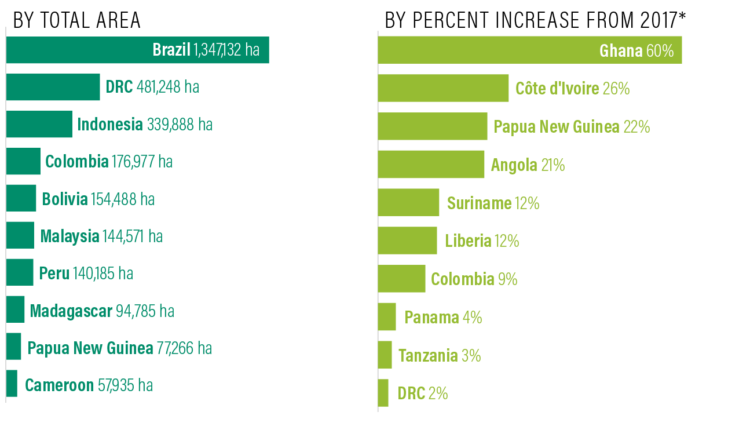Ghana’s forests are in deep crises and seem to be doing disappointingly and disastrously on a global ranking of forest losses as she comes first out of 10 top countries that lost most of their tropical forest in 2018.
A recent report by the Global Forest Watch (GFW) reveals that Ghana experienced the highest per cent rise in primary forest loss between 2017 and 2018.
While its Cocoa Producing counterpart, Côte d’Ivoire recorded 26 per cent on forest loss, Ghana is reported to have chalked an alarming 60 per cent increase.
This seems to be the first time Ghana is appearing on such global index and the development appears to have shaken the very core of the country’s existence.
According to the report, Illegal mining caused a large amount of the losses, and while it is difficult to attribute the exact location and amount of forest loss, expansion of cocoa farms in forest areas are said to have also contributed to this devastating development.
“Ghana, Côte d’Ivoire and leading cocoa and chocolate companies pledged in 2017 to end deforestation within cocoa supply chains. While this is a promising first step, the recent rise in primary forest loss—especially in protected areas, where 70 percent of the loss occurred—is a worrying sign,” the report said.
Other countries captured in this index, include Papua New Guinea, which had seen a 22 percent increase in forest loss and Angola saw a 22% loss. The rest are Surinam, 12%; Liberia 12%; Columbia, 9%; Panama, 4%; Tanzania, 3% and Democratic Republic of Congo (DRC) at 2%.
On a whole, the world lost 3.6 million hectares of primary rainforest last year—an area the size of Belgium.
When it came to countries that lost the most of their tropical rainforest in terms of size, Brazil topped the chart at 1,347,132 ha and DRC followed at 481,248 ha.
Action Now
Given the urgency to prevent further losses as well as an impending runaway climate change and irreversible biodiversity loss, government has been charged to bridle in deforestation before it’s too late.
Already, the authorities had come under serious fire as environmentalists fear the 23,000-hectare Atewa Forest Reserve will be under threat of deforestation when government embarks on a $2 billion bauxite mining deal with China.
The Atewa Forest, located in the Eastern Region and among the 260 forest reserves in the country, is one of the largest remaining blocks of tropical forests and one of the healthiest and important ecosystems in West Africa.
Environmentalist and Civil Society groups, including A Rocha Ghana, Concerned Citizens of Atewa, Friends of the Earth, amongst others, have insistently condemned the arrangement to mine in the Atewa forest.
They urgde government to designate the Atewa Forest as a National Park and further asked that Atewa Forest Reserve be turned into an ecotourism attraction where its sanctity will be preserved for generations unborn.
By: Grace Ablewor Sogbey


Comments are closed.